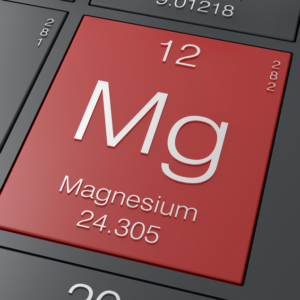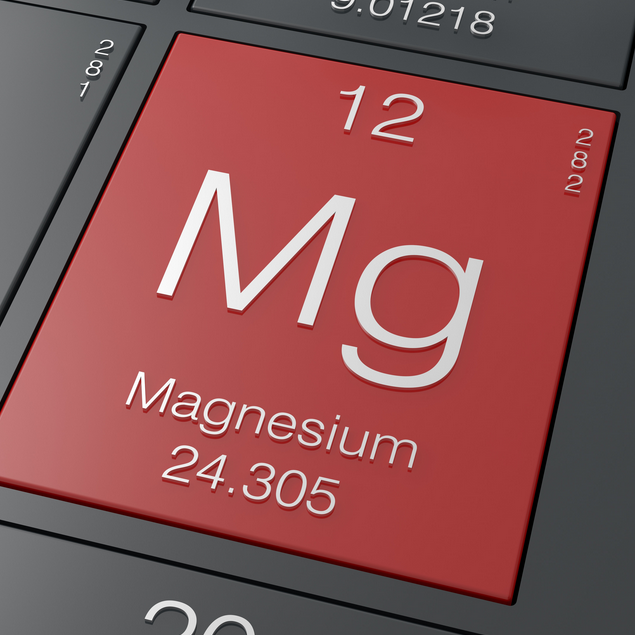Magnesium is a macromineral that plays a vital role in over 300 metabolic reactions. As proof of its importance, every cell in your body needs magnesium to make energy. Yet, for most people, the health benefits of this critical mineral are not as well known as calcium and Vitamin D. Some people may be deficient and not be aware of it. Let's look at some of the surprising reasons why you should be thinking about how much magnesium you are consuming. Along the way, you'll also discover how much is used in research and some magnesium side effects you should know about too.
1. What Is the RDA?
- For men (19-30 yrs): 400 mg per day
- Men over age 31: 420 mg per day
- For women (19-30 yrs): 310 mg per day
- Women over age 31: 320 mg per day
- Pregnancy (19-30 yrs) 350 mg per day
The RDA refers to elemental magnesium. Elemental refers to the fact that Mag is an element. It appears on the periodic table of elements.
Its symbol is Mg.

Chelated Minerals
Generally, only about 30% of magnesium in foods is absorbed. To boost absorption, supplement companies may combine it with other things. When this happens, it is called a chelated mineral.
For example, there are supplements called magnesium gluconate and aspartate. When determining Mg dosage in a supplement, look for how much is elemental. This is the actual amount of the mineral in the supplement. For example, a supplement may have 500 mg of magnesium gluconate – but only 30 mg of elemental Mg.
The elemental dosage is often listed on the Supplement Facts label. Supplements usually tell you the milligrams of the elemental mineral they contain.
2. What Foods Have Magnesium?
Here's a shortlist of Mg dense foods to help you meet your daily needs:
- Pumpkin seeds (3 oz): 262 mg
- Cashews (3 oz) 292 mg
- Black beans (3 oz) 171 mg
- Spinach (cooked, 1 cup) 157 mg
- Oatmeal (3 oz) 137 mg
- Brown rice (1 cup) 86 mg
- Butternut squash (1 cup) 59 mg
- Kale (3 oz) 47 mg
- Lima beans (3 oz) 43 mg
- Dark chocolate (1 oz) 41 mg
- Non-fat milk (8 oz) 37 mg
- Brustle sprouts (3 oz) 23 mg
- Orange (1 small) 23 mg
Pro tip: remember, if the food is green or has fiber, it will have magnesium.
3. Who Are Deficient In Magnesium?
Some health conditions and lifestyle factors can predispose people to have hypomagnesemia or low levels of Mg. Some examples include:
- Type II diabetes
- Crohn’s disease
- Celiac disease
- Alcoholics
- Bariatric weight loss surgery
- People who eat predominantly processed/fast foods
Older people may also be at risk due to reduced magnesium absorption and medications they may be taking.
4. Magnesium Helps Diabetes

Many clinical studies testify to the benefits of magnesium for diabetics. Studies show magnesium can reduce insulin levels, making it popular with those with metabolic syndrome (pre-diabetes). People with type II diabetes tend to have low levels of this mineral too.
In one study, researchers observed that 65% of type II diabetics had low mag levels. The low levels may be due to poor food choices as well as diabetes medications such as metformin. To see if supplements can help, researchers gave diabetics 250 mg of magnesium or a placebo for 3 months. They observed that Mag supplements significantly lowered:
- HBA1C levels
- insulin levels
- the inflammation marker, C reactive protein (CRP)
The decline in hemoglobin A1C declined by almost 8%. That's a lot!
When reviewing previous investigations, of type II diabetes, researchers noted Mag supplements can improve:
- fasting blood sugar levels
- LDL (bad cholesterol)
- HDL (good cholesterol)
- triglycerides
- systolic blood pressure (the top blood pressure number)
They further stated the effect was greatest in those with low Mag levels to begin with. Remember, many with type 2 diabetes have low magnesium levels. Diabetes is linked to cellular inflammation. There is evidence magnesium supplementation for 6 weeks reduces the expression of genes involved in the inflammatory process.
5. Magnesium And Cerebral Palsy
Cerebral palsy is a congenital neurological disorder that results in problems with movement and coordination. Several studies demonstrate less cerebral palsy cases in mothers who were given magnesium supplements during pregnancy. In one investigation, researchers looked at 3 previous studies, involving almost 6,000 women. They concluded there was very good evidence for magnesium sulfate-reducing cerebral palsy risk.
To quote the researchers, the data show “conclusively that magnesium sulfate, when given to women at imminent risk for preterm delivery, decreases the offspring's cerebral palsy risk.” Pretty strong words!
The best time to give magnesium to pregnant women is not known. Some research says before 28 to 30 weeks of pregnancy. Talk to your doctor for the right dose for you. Given the research, it's possible magnesium may one day be considered as important for pregnancy as folic acid.
6. What About Leg Cramps?
Some researchers find the mineral may reduce leg cramps in pregnant women. In one study, 300 mg of magnesium bisglycinate reduced the frequency and severity of leg cramps by 50%. Magnesium bisglycinate is also found in the BioOptimizers Magnesium Breakthrough supplement.

Other studies have noted improvement in nighttime leg pain when 300 mg of the mineral was given to people for 6 weeks. Not all studies show Mag supplements help such as this one where supplements, taken for 1 month did not improve leg cramps in pregnant women.
7. Good News For High Blood Pressure
Most people think about beets when wondering what supplements help with high blood pressure. But, several studies also demonstrate Mag supplements also improve blood pressure too. In one study, 49 people with hypertension were given 300 mg of magnesium oxide each day for 1 month. Results showed significant declines in both systolic and diastolic blood pressures.
In another investigation researchers, looking at 5 previous studies noted magnesium supplements significantly lowered both systolic and diastolic blood pressure in diabetics after 1 to 3 months of use.
Looking at 34 previous studies, involving over 2000 people, researchers concluded a dose of 368 mg a day for 3 months resulted in a 2 point drop in both systolic pressure (the top number) and diastolic blood pressure (the bottom number).
8. Can Magnesium Help Depression?

According to some, higher magnesium levels may reduce the risk of depression. In one study, researchers observed low magnesium levels were associated with more depression. While encouraging, this does not prove depression is linked to low mineral levels.
The real test would be to give magnesium supplements to people with depression and see if they improved. At least one investigation noted improvement in depression when magnesium was given to people with fibromyalgia. Here, researchers saw improvement in depression and fibromyalgia pain when people took 300 mg of magnesium citrate for 8 weeks. Those researchers also speculated that low Mag levels may be related to fibromyalgia pain.
In a larger trial, 112 people with mild to moderate depression, were given 248 mg of elemental magnesium chloride for 6 weeks. The supplement used was by Alta Health Products. While the study lacked a placebo group, researchers observed clinically significant improvement in both men and women. Improvements in depression symptoms started to show up within 2 weeks.
To quote the researchers “Magnesium is effective for mild-to-moderate depression in adults. It works quickly and is well tolerated without the need for close monitoring for toxicity.”
In another study older adults with diabetes and low magnesium levels were given either an anti-depressant drug (Imipramine/ Tofranil ) or 450 mg of elemental magnesium chloride for 12 weeks. Here, researchers noted both the mineral and the drug improved depression symptoms. So, the supplement and the drug worked the same. Yet, only the supplement raised Mg levels, suggesting the mineral may work through a different biological pathway than the drug. Either way, it's more good news for Mag supplements.
To be fair not all studies show Mag supplements work such as this one where over 9,000 women for several years.
What About Major Depression?
As the name tells us, this is a much more serious form of depression. Although limited, some evidence hints Mg may help major depression too. In one very interesting report, researchers described the rapid recovery of major depression in 3 people. In one of the individuals, the benefits were said to be “life-saving.” All three people in this report were said to have recovered from major depression symptoms quickly – in as soon as a week. In each of the 3 cases, benefits were seen when people took 125 mg to 300 mg with each meal and at bedtime.
See the video review on how the mineral helps depression for more on this research.
9. Magnesium For Migraines
Some studies show migraine headache sufferers have low salivary magnesium levels. Deficiency in this mineral can also lead to increased inflammation and blood vessel constriction in the brain. So can Mag supplements help? Maybe. In one study, which lasted 3 months magnesium reduced migraine headaches by 50%! In that study, people took 243 mg of magnesium aspartate each day. Other investigations showing benefits have used as much as 600 mg per day.
In another study, researchers found magnesium infusion worked just as well as drugs at reducing headache pain. Encouraging but remember, good results with infusion (injection) may not be the same as with mag supplements.
That said when looking at the overall studies conducted since the 1990s, researchers concluded: “there is a strong body of evidence demonstrating a relationship between magnesium status and migraine development.”
Migraine Headaches: Which Supplements Can Help?
10. It May Help You Sleep Better
It's estimated that over 50% of older people have difficulty getting to and staying asleep. Insomnia is associated with increased cellular inflammation. Since Mag supplements can reduce inflammation, would they help you sleep better? Maybe. In one study, researchers observed magnesium supplements raised the sleep hormone, melatonin. It also reduced the stress hormone, cortisol too. In that investigation, researchers gave 46 older people with insomnia either a placebo or 500 mg of elemental Mag per day for 8 weeks.
In another study, the combination of magnesium (225 mg), zinc (11.25 mg), and melatonin (5 mg), taken before bedtime, improved sleep better than a placebo when they were given to insomniacs for 8 weeks.
As an aside, I noticed improvements in mood and sleep when I tried this supplement for 3 weeks.
11. Magnesium & Muscle Soreness
Delayed muscle soreness (DOMS) is muscle pain that you feel 1 to 2 days after exercise. The reasons why muscle soreness happens after exercising is still a mystery. At least two studies suggest magnesium might muscle pain. In one study, researchers gave 350 mg of Mag to college students for 10 days before they performed exercises designed to produce muscle soreness. Compared to when they took a placebo pill, students reported significantly less muscle soreness when they took the magnesium supplement.
In another investigation, researchers noted that 500 mg of Mag given to people 1 week before exercise reduced muscle soreness and an inflammation molecule called interleukin 6 (IL-6). The people in this study were purposely put on a low Mag diet for 10 days to reduce the effects of food sources of the mineral.
Ironically, Mag supplements did not reduce creatine kinase (CK), a common marker of muscle damage. So, if Mag supplements are not reducing exercise-induced muscle damage, how are they improving muscle soreness? The mystery continues…
12. Help For Bone Loss?
Magnesium increases calcium absorption. Women with osteoporosis tend to have low Mg levels. Thus, this mineral may play a role in reducing bone loss, helping osteopenia, and osteoporosis. So far, it's unknown how well supplements help. Better studies need to be done to know if Mag supplements help build bone or reduce its breakdown. Until more is known, opt for Mg-containing foods.
13. Magnesium And Strokes
Several lines of evidence point to fewer strokes in people who eat a magnesium-rich diet. Given the beneficial effects of magnesium on lowering blood pressure, this does make sense. However, because healthy foods contain thousands of molecules, it's difficult to pin down if fewer strokes are due to the mineral alone.
Other researchers have reported less heart disease in people with higher blood magnesium levels. Could this also be due to the benefits of eating healthy foods or the magnesium itself? When it comes to brain and heart health, my money is on the foods.
14. What Reduces Magnesium Levels
Here's a short list of things that can reduce levels of this mineral:
- Blood sugar-lowering medications (e.g. metformin, etc.)
- Ulcer medications (proton pump inhibitors)
- Antiacids
- Some osteoporosis medications
- Calcium supplements
- Vitamin D supplements
- Zinc supplements
- Some cancer meds
- Some diuretics
- Some immune-suppressing drugs
This list is not complete. There are others too. Speak to your doctor/pharmacist for the best information for you.
15. Magnesium Can Interfere/Interact With
Here is a shortlist of things Mg supplements can potentially interfere with:
- Antibiotics
- Parkinson's disease meds (e.g. levodopa)
- Osteoporosis medications
- Heart medications
- Blood thinners
- Muscle relaxers
- Kidney medicine
This list is not complete. Drug-supplement interactions are complicated. Speak to your doctor/pharmacist for the best information for you.
16. Magnesium Side Effects
Magnesium is safe when consumed in foods. Like all supplements, it's possible to take too much. Side effects increase when taking more than 350 mg per day. The most common side effect of supplements is diarrhea. This is due to the mineral's affinity to water where one magnesium ion can bind up to 800 water molecules in the intestinal tract. Other side effects of taking too much Mg include nausea and even vomiting.
Here are some things to consider when taking Mg supplements. This list is not complete:
- Start with less than recommended for the first week. Slowly increase the dosage to what you feel is best for you.
- If Mag supplements make you sleepy, avoid driving
- Stop at least 2 weeks before surgery
- If you take blood thinners, ask your doctor
- Ask your doctor first if you have heart or blood pressure problems
- If you take any medications, speak to your doctor and pharmacist
- Kidney problems can cause magnesium to build up too high in the body

What Do I Suggest
If you're considering a supplement, here are some brands I like:
Is Magnesium Right For You?
Since the mineral is involved in over 300 enzyme reactions, the proof is clear that magnesium is for everybody. A variety of studies show that increasing magnesium intake through foods or in combination with a supplement may offer a spectrum of benefits ranging from depression to diabetes. Start by looking at the foods you eat. Decide from there if a supplement is right for you.

Why would you recommend Nature Made; it only has one type of mg – Oxide, 250.
Breakthrough seems comprehensive but expensive.
It may be the best way to go, and you sort-of, recommend it.
A.J. Here’s my review of Magnesium Breakthrough. As you can see I did list Magneiusm Breakthrough in the recommended list. I listed Nature Made too because they are a quality company and there have been clinical studies on magnesium oxide.
I did not know vitamin D can drain magnesium levels from the body. I take 2000 IU vitamin D per day. Do you think that’s lowering my magnesium levels?
Tommy, It’s hard to say. While that’s not a lot of vitamin D, we need to consider the foods you eat and even your age (sometimes we absorb less magnesium as we get older). The best way to tell is by getting your magnesium levels checked. I doubt mag is being tested on a regular blood test so you may have to request it. The good news is magnesium supplements are not expensive. Here is an inexpensive brand I like
That was SO interesting what you wrote about magnesium and depression. I can attest to the effects of magnesium on mood. Supplements have made a difference in things for me. I don’t know if I would say I have “depression” but I do notice when I miss a few days of my magnesium. It’s hard to put my finger on it but I just feel better. I read your previous review on how you felt when you tried Breakthrough magnesium. I may try that to see how I feel when what I’m using now runs out.
Thank you so much for sharing your knowledge with us. I’ve been reading your newsletters for over 10 years and you never disappoint. You are a blessing.
Shelia, you are very kind. I’m really glad to hear magnesium is benefiting you. 🙂
Fantastic review! I totally agree that magnesium is an under-appreciated nutrient. Even though I think I eat a pretty good diet I’ve been taking magnesium supplements for the past 3 years. I started to notice improvements in sleeping after 1 week. I do have fibromyalgia and think it helps my pain levels too.
Thanks, Joe for reassuring me that I am doing the right thing for me 🙂
Jane thanks so much. Since you have fibromyalgia, check out my review of ribose. There’s some really interesting research on ribose supplements helping fibromyalgia